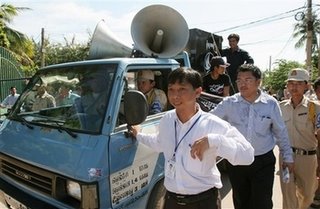 Pa Gnuon Tieng, front in white shirt, deputy director of the Cambodian Center for Human Rights, and his public relation officer, Ou Virak, second right, walk along a truck after police confiscated their truck in Phnom Penh, Cambodia, Monday, Sept. 4, 2006. Cambodian police on Monday prevented Kem Sokha's group from holding an anti-corruption rally, in the graft-ridden Southeast Asian government's latest bid to curtail civil liberty. (AP Photo/Heng Sinith)
Pa Gnuon Tieng, front in white shirt, deputy director of the Cambodian Center for Human Rights, and his public relation officer, Ou Virak, second right, walk along a truck after police confiscated their truck in Phnom Penh, Cambodia, Monday, Sept. 4, 2006. Cambodian police on Monday prevented Kem Sokha's group from holding an anti-corruption rally, in the graft-ridden Southeast Asian government's latest bid to curtail civil liberty. (AP Photo/Heng Sinith)Cambodian police block human rights group's attempt to hold anti-corruption rally
By SOPHENG CHEANG
2006-09-04
PHNOM PENH, Cambodia (AP) - Cambodian police on Monday blocked a prominent human rights group from holding a rally to protest government corruption.
The rally was organized by the U.S.-funded Cambodian Center for Human Rights to promote nationwide awareness about corruption.
The centerpiece of the campaign is the installation of so-called black boxes at the center's offices across the country, where people can report information about corruption they have experienced, the group said in a statement.
A truck carrying one of the boxes, measuring 1 meter by 1.2 meters (3.2 feet by 3.9 feet), was scheduled to drive through the capital Phnom Penh on Monday.
But 40 police, some armed with guns and batons, stopped the truck after it had driven about 50 meters (54 yards) from the center's office. Police took the truck and detained its driver.
Khuong Sreng, the deputy chief of Phnom Penh Municipality's Tuol Kork district, said the government did not allow the rally to take place on the grounds of maintaining public order. He did not elaborate.
Kem Sokha, director of the human rights center, said the rally was aimed at providing a greater opportunity for citizens to take part in addressing widespread corruption in Cambodia.
He said the government should work with his group in curbing corruption instead of preventing the rally.
The Cambodian government has been repeatedly criticized by foreign aid donors and civil society groups for doing little to tackle corruption.
Last month, the independent Economic Institute of Cambodia said in a report the government lost an estimated US$400 million (euro 312 million) in tax revenue because of corruption in 2005.
It based its findings on interviews with 1,200 enterprises in nine municipalities and provinces of Cambodia, which said they had to pay bribes to countless government agencies in exchange for their services.
The report drew an angry reaction from Prime Minister Hun Sen, who said his government is working hard to combat smuggling and tax evasion to increase state revenue.
The rally was organized by the U.S.-funded Cambodian Center for Human Rights to promote nationwide awareness about corruption.
The centerpiece of the campaign is the installation of so-called black boxes at the center's offices across the country, where people can report information about corruption they have experienced, the group said in a statement.
A truck carrying one of the boxes, measuring 1 meter by 1.2 meters (3.2 feet by 3.9 feet), was scheduled to drive through the capital Phnom Penh on Monday.
But 40 police, some armed with guns and batons, stopped the truck after it had driven about 50 meters (54 yards) from the center's office. Police took the truck and detained its driver.
Khuong Sreng, the deputy chief of Phnom Penh Municipality's Tuol Kork district, said the government did not allow the rally to take place on the grounds of maintaining public order. He did not elaborate.
Kem Sokha, director of the human rights center, said the rally was aimed at providing a greater opportunity for citizens to take part in addressing widespread corruption in Cambodia.
He said the government should work with his group in curbing corruption instead of preventing the rally.
The Cambodian government has been repeatedly criticized by foreign aid donors and civil society groups for doing little to tackle corruption.
Last month, the independent Economic Institute of Cambodia said in a report the government lost an estimated US$400 million (euro 312 million) in tax revenue because of corruption in 2005.
It based its findings on interviews with 1,200 enterprises in nine municipalities and provinces of Cambodia, which said they had to pay bribes to countless government agencies in exchange for their services.
The report drew an angry reaction from Prime Minister Hun Sen, who said his government is working hard to combat smuggling and tax evasion to increase state revenue.

























No comments:
Post a Comment